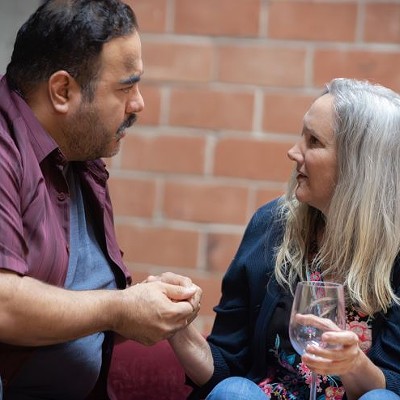The Imposter features Frédéric Bourdin, Carey Gibson, Beverly Dollarhide and Nancy Fisher; Bart Layton directs.
Filmmaker Bart Layton's 2012 documentary The Imposter tells an almost unbelievable story about a Texas family that embraced the brown-haired, brown-eyed 23-year-old Frenchman who claimed to be their missing blond, blue-eyed American teenaged son.
In 1994, the thin, delicately featured Nicholas Barclay went missing in San Antonio, Texas. Three and a half years later, Spanish authorities contacted the family with good news. Barclay had been found. He had been abducted by a prostitution ring but managed to escape, and was anxious to return home. Barclay's older sister, Carey Gibson, flew to Spain to bring him home. Instead of her brother, she found Frédéric Bourdin. Somehow, Bourdin convinced Gibson that he was her brother. (He explained the change in his eye color by saying his captors had put drops in his eyes to darken them so he would not be recognized. He explained his heavy French accent by saying his captors had not allowed him to speak English.) He returned to San Antonio with her. There he met Beverly Dollarhide, Barclay's mother, and other relatives, all of whom accepted him, despite overwhelming evidence to the contrary, as the missing boy.
"This is an almost impossible story," says Layton. "If it were a work of fiction, you'd think it were far-fetched. But it wasn't a work of fiction; it really did happen. Like viewers, I was flabbergasted by it."
The project began when Layton found a newspaper article describing Bourdin's exploits, how he had spent a large part of his youth traveling throughout Europe pretending to be a series of orphaned or abused children. He'd spent time in children's shelters, being found out as often as not, and then moving on.
"He was already known in Spain as The Chameleon," he says. "I found stories in the British and American media that talked about this series of events in Texas. It was just jaw-dropping. That was the starting point for me, trying to figure out what kind of a person was capable of doing something like this. And then, of course, trying to find out what kind of a family would be capable of falling for it.
"It starts off as a story about deception, but it quickly becomes a story about self-deception."
Bourdin and the family, Spanish and American officials describe their part in the story looking directly into the camera. There are a few re-enactments, but the majority of the film is a series of talking heads. Still, The Imposter is gripping.
Layton says the technique was quite purposeful. "That's one of the things that as a filmmaker I wanted to have happen, that you as an audience would have this direct, almost face-to-face experience with him. There's a real ambiguity with Bourdin. You have to choose to believe what you will about what he tells us. In the end, you have to think, how much are you being manipulated by this master manipulator? And if he can do that in a film, how much more powerful was he in person when he was dealing with this family that desperately wanted to believe that Nicholas was alive?"
Getting Bourdin and Barclay's family to appear on camera and discuss the story was a coup for Layton. Without them, the film wouldn't have worked. (Re-enactments can't convey the flat affect of Barclay's mother. When asked how she could believe Bourdin was her son, she responds blankly, "At that point, my main goal in life was not to think.")
"We wouldn't have had a film if they hadn't been willing to participate. With the family, they had done a couple of interviews before and they felt that it had not gone well for them. They felt that they hadn't been fairly portrayed, so they were very hesitant to do anything else.
"And him -- for someone who wasn't a very trustworthy character, he wasn't very trusting, either. He was worried about what our intentions were. A lot had been written about him, but he really hadn't been able to tell his story in his own words," says Layton.
"What I said to them was that I wanted them to tell their story in their own words and that there was no hidden agenda. I wasn't trying to make a film that was going to be judgmental. I think on some level they wanted to tell their side of the story. I offered them the chance to do that."
He goes on, "It would have been easy to make a film that looks down at this group of people. You think, how could he be so cruel as to claim to be a missing boy and give a family false hope? How could a family not know their own flesh and blood? But when you're watching, that's not what you're thinking. You really get to know them, you understand that maybe they had reasons for desperately needing to believe something that obviously can't be true."
Bourdin, Layton notes, had no financial motives. (Barclay's family was far from wealthy and rather than living in a big, glamorous city, Bourdin finds himself in a low-income San Antonio neighborhood.) "He tells us that he was a kid without a family and this was a family without a kid. They both needed each other. It's very twisted logic, but on some strange level, he felt that added up to some kind of excuse for what he did."
Asked if he thinks the story has a happy ending, Layton says, "I think it certainly isn't the Hollywood ending...I don't want to give too much away, but think the ending is fitting. This is a true story and in life, oftentimes, things don't end up neat and nicely tied up."
The Impostor is screening at Sundance Cinemas daily through August 23. For information, visit the theater's Web site. $7.50 to $10.50.





